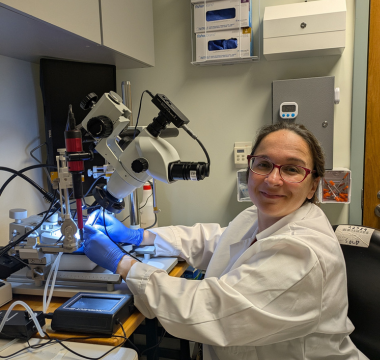My PD Story

Nuria Vendrell Llopis, PhD
2025 Impact Award
Untangling the Importance of Protein Clumping in Parkinson’s Cognitive Symptoms
Parkinson’s disease (PD) is primarily known for its movement symptoms such as tremors, rigidity and slowness. However, most people with PD also develop other non-movement symptoms, including changes in thinking and memory.
Nuria Vendrell-Llopis, PhD, recipient of a Parkinson’s Foundation Impact Award, is uncovering whether the likely biological cause for PD movement symptoms also contributes to PD-linked thinking impairment. Understanding how movement and non-movement symptoms overlap or diverge could lead to new diagnostic and treatment tools for PD cognitive symptoms.
“Our research aims to investigate how the accumulation of alpha-synuclein, a protein associated with Parkinson’s disease, disrupts the brain circuits that support learning and other cognitive functions.” — Dr. Vendrell-Llopis

In PD, clumps of misfolded alpha-synuclein proteins often accumulate in fragile dopamine-producing neurons in the brain. These clumps, called Lewy bodies, disrupt the function of these neurons and contribute to their breakdown over time. These dopamine neurons are important for movement, so movement symptoms caused by their disruption in PD makes biological sense.
However, misfolded alpha-synuclein can also form clumps in other neurons in the brain, including those considered to be important for cognition. To date, the association between Lewy bodies and cognitive PD symptoms is not as well understood. Dr. Vendrell-Llopis, from her lab at the University of Alabama at Birmingham, will utilize cutting-edge brain imaging technologies to observe and measure how alpha-synuclein clumps impact learning patterns in mice. She will inject these clumps into neurons within mice, then train those mice to perform a task that uses these specific neurons to receive a reward.
Some neurons will develop clumps of alpha-synuclein, while others will not. By directly comparing the activity of neurons with and without alpha-synuclein clumps during this learning task, Dr. Vendrell-Llopis hopes to determine if Lewy bodies are a likely cause of PD-related cognitive symptoms.
The data collected from these complex studies will allow Dr. Vendrell-Llopis and her team to see which factors, including alpha-synuclein clumping, aging and neuron loss, most affect cognition. She will also perform longer-term studies with these mice, seeing if their learning abilities diminish over time due to progressive alpha-synuclein impacts.
“The knowledge and tools from this work could make it possible to detect cognitive problems in Parkinson’s disease much earlier, even before standard tests detect any symptoms,” said Dr. Vendrell-Llopis. “Our approach can be used to test new treatments, providing real-time feedback on how therapies impact brain activity and cognitive performance."
Meet more Parkinson’s researchers! Explore our My PD Stories featuring PD researchers.
Related Materials
More Stories
from the Parkinson's community


